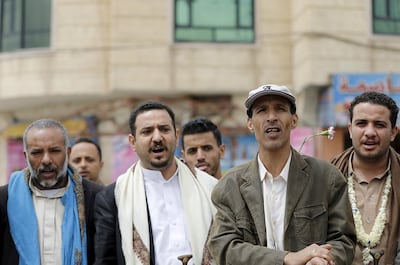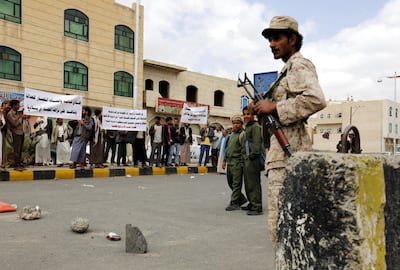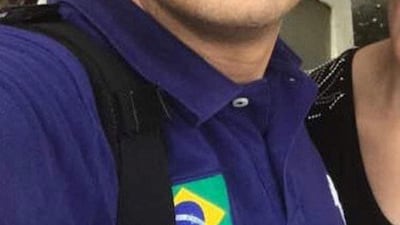Yemen's Bahais and the charges they often face
The Baha'i faith was made known in Yemen in the 19th century, first introduced by an Iranian man named Ali Muhammad Al Shirazi, considered the Herald of the Baha'i faith in 1844.
The Baha'i faith has had a growing number of followers in recent years despite persecution in Yemen and Iran.
Today, some 2,000 Baha'is reside in Yemen, according to Insaf.
"The 24 defendants represented by the House of Justice, which has intelligence outfits from the uS and the UK working to carry out an espionage scheme in Yemen under the guise of religion.. aimed to impant and found the Bahai sect on Yemeni soil by bringing foreign Bahais from abroad and homing them in Yemen," the charge sheet said.
Baha'Ullah, the founder of the Bahai faith, was exiled by the Ottoman Empire in 1868 from Iran to what is now Israel. Now, the Bahai faith's highest governing body, known as the Universal House of Justice, is based in the Israeli city of Haifa, which the Bahais turn towards during prayer.
The Houthis cite this as collective "evidence" of Bahai "links" to Israel - which the Houthis consider their enemy.
A tip-off about a Houthi-led raid gave Nadim Sakkaf's family minutes to pack up their life and run house-to-house through Sanaa before finally fleeing Yemen for the safety of Europe.
Mr Sakkaf, who was not in the country at the time, waited anxiously until his family made it out and they were reunited.
He is one of 24 Yemeni-Bahais accused of espionage by Yemen's Iran-backed Houthi rebels.
It is a claim rights groups and governments say is an orchestrated persecution of the religious minority, using fictitious allegations and inhumane detentions.
Houthi control over Yemen's most populous areas trickles into almost every area of ordinary life.
But the international community repeatedly sounds the alarm over the rebels singling out 0.5 per cent of Yemen's 30 million people – its religious minorities.
Mr Sakkaf is one of the small Bahai community accused of espionage, among a list of charges, and like many he fled the war-torn country, leaving everything behind.
The Houthis accuse the men, women and one minor who make up the list of 24 defendants, of using their religious worship as a guise for malignant activities.
Mr Sakkaf and others who were sent to Houthi jails, said that intimidatory tactics such as throwing them in cells with ISIS and Al Qaeda members are regularly used.
The Houthi-run National Security Bureau's charge sheet for the 24, seen by The National, accuses them of "operating for the Israelis as one cell".
It is an accusation the Bahais say is often levelled against their community because the religion's highest governing body, the Universal House of Justice, has long been based in Haifa, in Israel.
A history of abuse
Before the war began when the Houthis seizd Sanaa in 2015, Mr Sakkaf had a job as the deputy director of the British Council, a UK educational and cultural institution that works around the world.
He was later promoted to country manager in Yemen, continuing the role he filled in Malaysia until 2018.
The Sakkaf's family-founded NGO group also worked on social development projects with other agencies in rural areas.
Mr Sakkaf said this put him in the rebels' sights.
“They accused us of holding events and attempting to ‘indoctrinate’ the youth," he said.
Mr Sakkaf said he was repeatedly detained by the Houthis.
In 2016, they raided a workshop on social development and rounded up those taking part, among them his wife and sister-in-law.
“They called me and my brother to come so they could 'ask us a few questions'," Mr Sakkaf said.
"We knew there was a big possibility of us getting arrested too, but we went anyway, and sure enough, we were detained.”
Houthi interrogators accused him of being a spy for the British government because of his work. He was held after questioning.
"There were 42 of us in one cell, including eight or nine Al Qaeda members," Mr Sakkaf said.
“They threatened us in prison and mentioned that if we were released they would come after us.”
While most of the people arrested in the 2016 raid were released within a few hours or days, he languished for months in a Houthi prison.
Amnesty International, Human Rights Watch and the UN called for his release.
The UN Office of the High Commissioner for Human Rights said in 2016 that those captured in the sweep faced “harsh treatment” by the Houthi’s National Security forces.
“Interrogation of the detainees was mainly about the allegations of the source of funding of Bahai activities from Israel and the proselytisation of youth at the event,” the office said.
It said National Security extorted $14,000 from the families of Mr Sakkaf and his brother.
Months after his release, the Houthis went after his family home and the NGO's offices, raiding and looting them, he said.
While Mr Sakkaf and his family are now safe in Europe, the trial against him and 23 others, including his wife, continues.
In 2019, the US State Department voiced deep concern that the “Houthis continue to severely mistreat, arbitrarily detain and torture Bahais in Yemen".
"This persistent pattern of vilification, oppression and mistreatment by the Houthis of Bahais in Yemen must end," said spokeswoman Morgan Ortagus.
Amnesty International called the Houthis’ accusations bogus and the US Bahai Office of Public Relations made similar comments.
"This sham trial is nothing short of an embarrassment, having been condemned by all corners of the international community and the media," Anthony Vance, director of the US Bahai Office of Public Affairs, told The National.
Protecting Minorities
Yemen's minorities are not alone in their struggle. Eman Homaid runs Insaf, an organisation to protect and advocate for minorities in Yemen.
She works in secret with a team in Yemen, running reconnaissance and gathering information to help her highlight the plight of those being targeted by armed groups.
“For holding different beliefs, they face all kinds of mistreatment and discrimination by the Houthis,” Ms Homaid said.
Insaf was praised by the US State Department as a "pioneer in the struggle for religious freedom".
The group published one of the few comprehensive works on minorities in Yemen, detailing their history, their numbers and the challenges they face.
Ms Homaid is all too familiar with cases like Mr Sakkaf's and believes there is a lesson to be learnt from countries such as the UAE, where people of all faiths coexist in peace.
"This is the kind of society that I hope for in Yemen," she said.
"Yemen's population of minority groups such as Jews and Ismaelis is, unfortunately, dwindling as more people prefer safely exercising their religious freedoms over living in fear in their own home."
For the same reason Mr Sakkaf has no plans to return to Yemen.
Abu Dhabi Sustainability Week
The specs
Engine: 2.0-litre 4cyl turbo
Power: 261hp at 5,500rpm
Torque: 405Nm at 1,750-3,500rpm
Transmission: 9-speed auto
Fuel consumption: 6.9L/100km
On sale: Now
Price: From Dh117,059
England-South Africa Test series
1st Test England win by 211 runs at Lord's, London
2nd Test South Africa win by 340 runs at Trent Bridge, Nottingham
3rd Test July 27-31 at The Oval, London
4th Test August 4-8 at Old Trafford, Manchester
'The Woman in the House Across the Street from the Girl in the Window'
Director:Michael Lehmann
Stars:Kristen Bell
Rating: 1/5
Mercer, the investment consulting arm of US services company Marsh & McLennan, expects its wealth division to at least double its assets under management (AUM) in the Middle East as wealth in the region continues to grow despite economic headwinds, a company official said.
Mercer Wealth, which globally has $160 billion in AUM, plans to boost its AUM in the region to $2-$3bn in the next 2-3 years from the present $1bn, said Yasir AbuShaban, a Dubai-based principal with Mercer Wealth.
“Within the next two to three years, we are looking at reaching $2 to $3 billion as a conservative estimate and we do see an opportunity to do so,” said Mr AbuShaban.
Mercer does not directly make investments, but allocates clients’ money they have discretion to, to professional asset managers. They also provide advice to clients.
“We have buying power. We can negotiate on their (client’s) behalf with asset managers to provide them lower fees than they otherwise would have to get on their own,” he added.
Mercer Wealth’s clients include sovereign wealth funds, family offices, and insurance companies among others.
From its office in Dubai, Mercer also looks after Africa, India and Turkey, where they also see opportunity for growth.
Wealth creation in Middle East and Africa (MEA) grew 8.5 per cent to $8.1 trillion last year from $7.5tn in 2015, higher than last year’s global average of 6 per cent and the second-highest growth in a region after Asia-Pacific which grew 9.9 per cent, according to consultancy Boston Consulting Group (BCG). In the region, where wealth grew just 1.9 per cent in 2015 compared with 2014, a pickup in oil prices has helped in wealth generation.
BCG is forecasting MEA wealth will rise to $12tn by 2021, growing at an annual average of 8 per cent.
Drivers of wealth generation in the region will be split evenly between new wealth creation and growth of performance of existing assets, according to BCG.
Another general trend in the region is clients’ looking for a comprehensive approach to investing, according to Mr AbuShaban.
“Institutional investors or some of the families are seeing a slowdown in the available capital they have to invest and in that sense they are looking at optimizing the way they manage their portfolios and making sure they are not investing haphazardly and different parts of their investment are working together,” said Mr AbuShaban.
Some clients also have a higher appetite for risk, given the low interest-rate environment that does not provide enough yield for some institutional investors. These clients are keen to invest in illiquid assets, such as private equity and infrastructure.
“What we have seen is a desire for higher returns in what has been a low-return environment specifically in various fixed income or bonds,” he said.
“In this environment, we have seen a de facto increase in the risk that clients are taking in things like illiquid investments, private equity investments, infrastructure and private debt, those kind of investments were higher illiquidity results in incrementally higher returns.”
The Abu Dhabi Investment Authority, one of the largest sovereign wealth funds, said in its 2016 report that has gradually increased its exposure in direct private equity and private credit transactions, mainly in Asian markets and especially in China and India. The authority’s private equity department focused on structured equities owing to “their defensive characteristics.”
THE BIO
Family: I have three siblings, one older brother (age 25) and two younger sisters, 20 and 13
Favourite book: Asking for my favourite book has to be one of the hardest questions. However a current favourite would be Sidewalk by Mitchell Duneier
Favourite place to travel to: Any walkable city. I also love nature and wildlife
What do you love eating or cooking: I’m constantly in the kitchen. Ever since I changed the way I eat I enjoy choosing and creating what goes into my body. However, nothing can top home cooked food from my parents.
Favorite place to go in the UAE: A quiet beach.
Specs
Engine: Dual-motor all-wheel-drive electric
Range: Up to 610km
Power: 905hp
Torque: 985Nm
Price: From Dh439,000
Available: Now
Yemen's Bahais and the charges they often face
The Baha'i faith was made known in Yemen in the 19th century, first introduced by an Iranian man named Ali Muhammad Al Shirazi, considered the Herald of the Baha'i faith in 1844.
The Baha'i faith has had a growing number of followers in recent years despite persecution in Yemen and Iran.
Today, some 2,000 Baha'is reside in Yemen, according to Insaf.
"The 24 defendants represented by the House of Justice, which has intelligence outfits from the uS and the UK working to carry out an espionage scheme in Yemen under the guise of religion.. aimed to impant and found the Bahai sect on Yemeni soil by bringing foreign Bahais from abroad and homing them in Yemen," the charge sheet said.
Baha'Ullah, the founder of the Bahai faith, was exiled by the Ottoman Empire in 1868 from Iran to what is now Israel. Now, the Bahai faith's highest governing body, known as the Universal House of Justice, is based in the Israeli city of Haifa, which the Bahais turn towards during prayer.
The Houthis cite this as collective "evidence" of Bahai "links" to Israel - which the Houthis consider their enemy.




